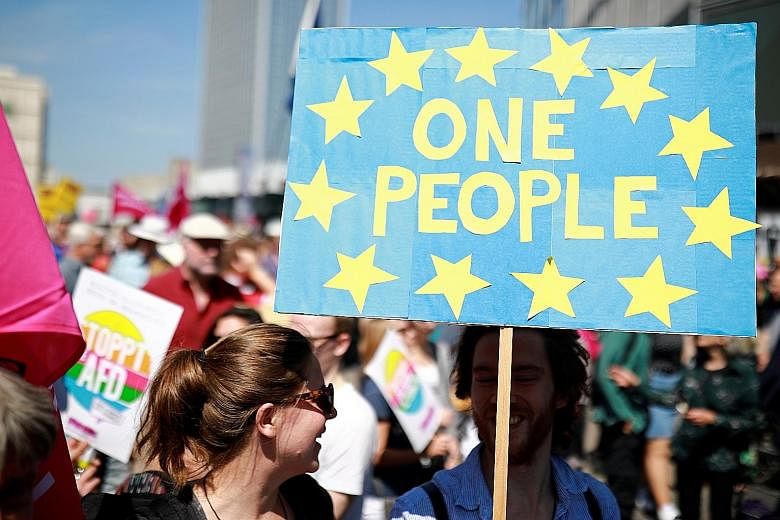BRUSSELS • Four days before Europe's 400 million potential voters are called to the polls, EU leaders hope to reverse the usual low turnout to avoid opening the door to eurosceptic forces.
The European Parliament, which will be elected in votes across 28 nations between Thursday and Sunday, has never been more important in framing the European Union's laws. But each such continent-wide vote since the first one in 1979 has seen a lower turnout than the last, and much of the energy in this year's race has come from populists opposed to deeper integration.
No big personalities have emerged among the supposed candidates to lead the European Commission, the top job in Brussels and one that may end up being assigned by Europe's national leaders. Political scientists say the European parliamentary election amounts to 28 parallel national votes, often marked by low turnouts and a strong tendency towards protest voting.
This will be the case in Britain, which kicks off the cycle of voting on Thursday and where Member of the European Parliament (MEP) Nigel Farage's Brexit Party is dominating the race.
But the spectacle of Britain's chaotic departure may have concentrated minds elsewhere in Europe, and a ZDF opinion poll found that 60 per cent of Germans may take part, up from 47 per cent in 2014.
Voter participation has traditionally been lowest among the young, but this year concerns about a "climate emergency" have seen hundreds of thousands take to the streets to demand action.
It has always been difficult to find candidates for top EU jobs who inspire passion across so many different countries and language groups, but previous front runners were at least experienced leaders.
None of the so-called "spitzenkandidats" - figures chosen by pan-European parties to lead their campaigns - is a former national leader.
Indeed, the front runner as head of the biggest group, the centre-right European People's Party (EPP), is obscure German conservative Manfred Weber, a veteran legislator with no executive experience and a low profile. Some low-watt star power is provided by outgoing Competition Commissioner Margrethe Vestager, whose career inspired the Danish fictional TV series Borgen, but her campaign never caught light.
In reality, if Mr Weber or Ms Vestager gets the job, it will not be the voters' choice but because member state leaders decide to nominate one of them after the political horse-trading that follows the vote.
For now, only Britain is on the verge of quitting the union altogether, but nationalists, right-wing populists and eurosceptic conservatives hope to break apart the cosy Brussels consensus.
Polling at the start of the campaign period pointed to around 173 members being elected from these groups, even if their own differences would make it hard for them to unify as one voting bloc.
It remains to be seen whether the spectre of a resurgent far-right will mobilise left-wing and liberal voters to block them. While they may remain the biggest voting blocs, the main centre-right and centre-left groupings that have dominated pan-European politics in recent years look set to lose ground.
Even if the Socialists hold the line, their strong contingent of Labour Party MEPs will only remain in Europe as long as Britain does, and outside of Spain, their other members are losing ground.
EU Commission President Jean-Claude Juncker's EPP may remain the largest group, but it has broken with allies from Hungarian Prime Minister Viktor Orban's Fidesz.
According to opinion polls, the top two groups could lose 30 seats each, so they will not be able to form a joint majority and may have to reach out to liberals and Greens.
For veteran Brussels insiders, the big night will not be Sunday, when the first results of the parliamentary race emerge, but two days later when the national leaders meet for dinner in Brussels.
The first shots have been fired, with German Chancellor Angela Merkel and French President Emmanuel Macron admitting to their differences, but between them, under EU Council President Donald Tusk, the leaders will debate the five top jobs in Europe.
AGENCE FRANCE-PRESSE

